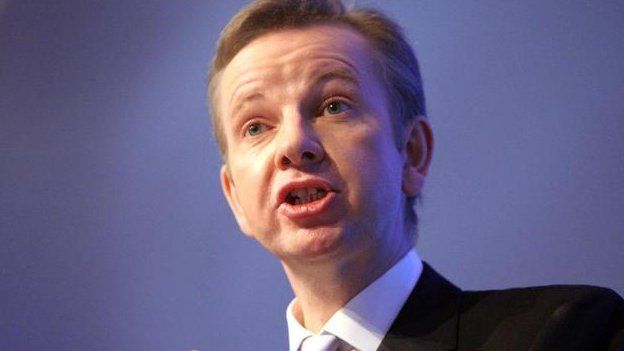Every school to become an academy, ministers to announce
Chris Cook Policy editor, Newsnight
Image copyright Thinkstock
Plans to force all schools in England to become academies are to be outlined in the Budget on Wednesday.
The Department for Education is expected to publish draft legislation as early as Thursday, BBC Newsnight has learned.
The move would end the century-old role of local authorities as providers of education.
An aide to the education secretary has declined to comment.
Back in October, David Cameron said he wanted "every school an academy… and yes - local authorities running schools a thing of the past".
At the autumn statement a month later, the official document stated that the government wanted: "The next step towards the government's goal of ending local authorities' role in running schools and all schools becoming an academy".
The proposals under consideration by Education Secretary Nicky Morgan owe much to a pamphlet by Policy Exchange, the Conservative-aligned think-tank, which proposes mass-converting the remaining local authority schools into academies.
That document proposed the change for mainstream schools, but did not deal with the future of special schools.
Image copyright European Photopress
Image caption Nicky Morgan is said to be considering the changes
Local authorities, in truth, have not "run" any mainstream schools since the early 1990s. They, instead, supervise them and offer them back-office services. The principal advantages to school leaders of academy status are that they are exempt from the national curriculum and the national pay regulations for teachers.
This report, in short, would mean the end of the national curriculum and national pay scales. By forcing the local authorities out of mainstream education, it would also finally unpick the local authority system of schools put in place in England by Arthur Balfour's Conservative government in 1902.
The proposals have been attacked by unions, local authorities and by the Labour party.
Lucy Powell, shadow education secretary, said: "There is no evidence to suggest that academisation in and of itself leads to school improvement... In some parts of the country where standards remain a concern, all schools are already academies, yet the government has no other school improvement strategy."
The changing academy programme
This proposal would mark a third phase in the academy programme.
Before 2010, around 200 schools were opened as academies or converted into them.
These were struggling schools that required fast turnaround or were opening in areas of educational weakness. To that end, these "sponsor academies" were given exemptions from the national curriculum and on teachers' pay to help them adapt to tougher-than-usual circumstances.
From 2010 to the present, however, schools have been allowed to become academies if they wish to do so. These are known as "converter academies" - and were then Education Secretary Michael Gove's big change to the system.
This was a popular programme (partly because academies got extra cash for converting). So at the last count, there were 3,381 state secondaries, of which 2,075 were academies.
Image copyright Getty Images
Image caption Former education secretary Michael Gove set out his new vision for schools in 2010
There remains, however, a big rump of schools which remain conventional local authority schools - particularly in the primary phase of education, where the cash incentives to convert were much weaker.
At the last full count, a year ago, there were 16,766 primary schools, of which 2,440 were academies. The remainder remain attached to the local authorities.
The think tank report,
Primary Focus, proposes that the government "convert all primary schools into academies, and then ask each school to join an academy 'chain' by 2020". The remaining LA secondaries, it proposes, should be encouraged along the same tracks, although there should be less pressure to join an academy chain.
The Policy Exchange piece proposes an end to the local authority as we know it, with its reduction to a rump provider of specialist services. It continues: "Any Local Authority that wishes to maintain a school provision service and run a chain or offer support to schools within a chain must spin out as a mutual or social enterprise and become a legally separate entity."
Practical problems
There are a few implementation issues here. The biggest of these is very simple -
we do not have enough good academy chains as it is. There is plenty of demand for school support services at the moment and some existing school chains are extremely weak; Sir Michael Wilshaw, the chief inspector, has recently started to
worry more about them.
Mary Bousted, general secretary of the Association of Teachers and Lecturers, said: "It is hard to see how the government's plans will work when there aren't enough high quality multi-academy trusts to cope with thousands more schools and some trusts are performing as poorly as the worst local authorities according to Sir Michael Wilshaw."
This proposal would also create a lot of work for the Department for Education, which has struggled with its existing workload. Since 2010, its role has gone from being a strategic body to deciding on rules for individual schools. The skills of its employees have not kept up.
Indeed, even the two most important things a Whitehall department must do, keeping to its budget and being accountable for spending, have proved beyond it. The free school programme showed that even the relatively simple task of opening new schools was extremely trying for them.
The Local Government Association, which represents the boroughs, has expressed concern about school accountability.
Roy Perry, chairman of the LGA's Children and Young People Board, said: "It's vital that we concentrate on the quality of education and a school's ability to deliver the best results for children, rather than on the legal status of a school...
"The LGA opposes both forced academisation, and giving significant powers relating to education to unelected civil servants with parents and residents unable to hold them to account at the ballot box."
Furthermore, this proposal would force the DfE to go ahead with plans to fix a number of awkward funding problems - for example, at what level it ought to fund small schools or schools with expensive private finance deals, for example. At the moment, local authorities absorb those problems. "Academisation" would remove that buffer.
http://www.bbc.co.uk/news/education-35814215
========
Thoughts? Is it realistic that this can be done across ALL schools in the UK AND in the suggested timeframe?




